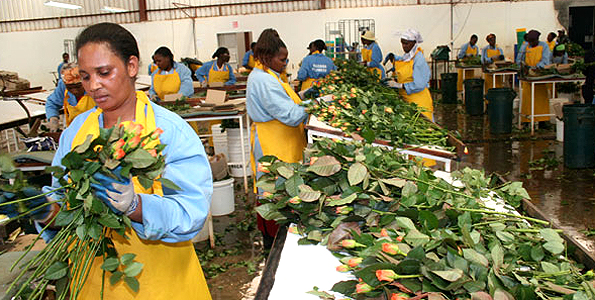Kenya exports to EU face taxes
The Nation (Nairobi) | 5 December 2009
Kenya exports to EU face taxes
By KABURU MUGAMBI

The European Union has for the first time indicated that the failure by the East African Community to sign a new trade agreement will lead to introduction of taxes on Kenyan exports to Europe.
Kenya exports about 450,000 tonnes of fruits and vegetables to the EU annually and is the number one cut flower exporter to the region. Currently, these products enter the EU duty-free.
Horticulture is Kenya’s leading foreign exchange earner, registering an impressive performance of over Sh73 billion from exports during the period ending December 31, 2008.
A report by professional services firm, PricewaterhouseCoopers, says that Kenya has become a major supplier of horticultural products, experiencing rapid growth in the past decade.
However, without the duty-free and quota-free access to the EU market, the sector would collapse, according to the EU-ACP Sustainability Impact Assessment of Economic Partnership Agreements report.
“If Kenya is unable to compete, that does not bode well for sustainability as Kenyan producers act as regional sector leaders,” says the report dated May 2007.
Fresh Produce Exporters Association of Kenya chief executive Stephen Mbithi said the association had seen willingness by EAC governments to sign the agreement. “But we wish that they move fast so that we can move forward,” he told the Sunday Nation.
The EU has been negotiating an Economic Partnership Agreement with African, Caribbean and Pacific countries since September 2002 with the aim of replacing non-reciprocal trade preferences granted under the Cotonou Agreement.
The East African Community is negotiating as a single entity.
Economic Partnership Agreement (EPA) is structured to introduce reciprocity to trade arrangements between the EU and developing nations to meet World Trade Organisation requirements.
While current EAC-EPA negotiations were supposed to be concluded by July 31, 2009 - but missed the deadline due to lack of consensus on rules of origin - most favoured a clause on agriculture, trade in services and sustainable development. However, the EAC and European Commission signed an Interim Framework on Economic Partnership Agreement in November 2007.
Two years on after the EU and EAC initialed the framework, it is yet to be signed. In the meantime, the two blocs are negotiating a broader agreement dealing with issues such as services, investment and intellectual property rights.
A statement released by the EU Delegation in Nairobi on December 3 said that failure to finalise the EPA process could lead to putting non-Least Developed Countries such as Kenya on the Generalised System of Preferences list.
“This would de facto mean re-introduction or increase in tariffs on a number of some of key Kenya’s export products,” the statement said.
The head of the union’s delegation to Nairobi Eric van der Linden said that EU-EAC trade and development relations need stability.
He said that as the EU-EAC interim EPA is pending the official signature, the EU is granting the preferences to EAC unilaterally which does not provide for a stable and sustainable ground for trade relations between the two blocks.
“Only a signature of the agreement can lock in the currently applied preferences in a legally sound framework,” Mr Linden said in the statement. “I am confident that now both sides better understand the potential of the EPA to provide for economic growth and job creation, and we look forward to working with all stakeholders to finally turn the EPA process into a success.”
The head of EPA unit at the trade directorate-general of the European Commission Jacques Wunenburger said that talk should now move from the “cost of EPA” to talk about the “cost of non-EPA.”
“This seminar has been very useful in enhancing the dialogue with key stakeholders in the EAC region,” he said during a meeting in Nairobi with EAC private sector representatives.
Failing to sign the framework agreement and to bring the broader EPA process to a successful conclusion, Mr Wunenburger said, can hamper trade and development prospects for the region.
“We do not want that, but this is really a choice only EAC players can make,” he said.





